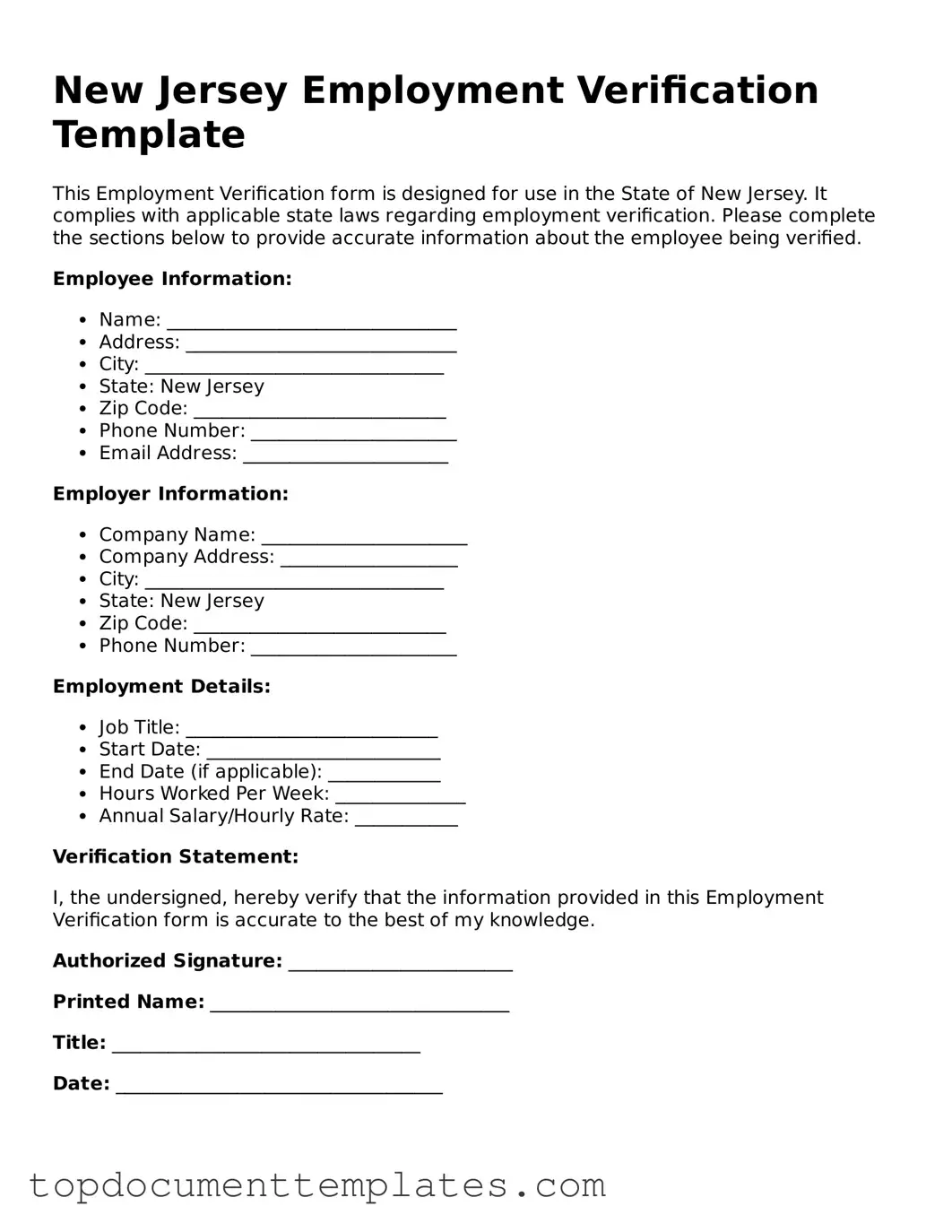Valid Employment Verification Form for New Jersey State
In the competitive landscape of employment, the New Jersey Employment Verification form plays a crucial role in establishing the authenticity of an individual's work history and qualifications. This form is essential for both employers and employees, serving as a key tool in the hiring process. It is designed to confirm details such as job titles, dates of employment, and the nature of the work performed. By providing accurate and verifiable information, the form helps to ensure that candidates meet the necessary requirements for various positions. Employers utilize this form not only to validate past employment but also to assess the reliability and integrity of potential hires. As such, understanding the components of the New Jersey Employment Verification form is vital for anyone navigating the hiring process, whether you are a job seeker aiming to present a strong application or an employer striving to make informed decisions. With its emphasis on transparency and accountability, the form underscores the importance of accurate employment records in today’s job market.
Similar forms
Pay Stubs: Pay stubs provide proof of employment and income, similar to the Employment Verification form. They include details about the employee's earnings, deductions, and employer information.
W-2 Forms: A W-2 form summarizes an employee's annual wages and taxes withheld. Like the Employment Verification form, it serves as evidence of employment and income for tax purposes.
Offer Letters: An offer letter outlines the terms of employment and confirms a job offer. This document is similar in that it verifies the individual's employment status.
Employment Contracts: Employment contracts detail the terms of employment between an employee and employer. They verify the employment relationship, similar to the Employment Verification form.
Reference Letters: Reference letters from previous employers can serve as informal verification of employment. They often include the duration of employment and job performance.
Social Security Administration (SSA) Verification: SSA verification can confirm an individual’s work history and earnings. This document serves a similar purpose to the Employment Verification form.
Background Check Reports: Background checks often include employment history verification. They confirm past employment and are used in the hiring process, similar to the Employment Verification form.
Unemployment Insurance Records: Unemployment records provide proof of employment status and earnings history, similar to the Employment Verification form. They are often used when applying for benefits.
Guidelines on Writing New Jersey Employment Verification
Once you have the New Jersey Employment Verification form, you will need to complete it accurately to ensure proper processing. Follow these steps carefully to fill out the form correctly.
- Begin by entering your personal information in the designated fields. This typically includes your full name, address, and contact information.
- Provide your Social Security number, if required. Make sure to double-check for accuracy.
- Fill in your employment details. This includes the name of your employer, your job title, and the dates of your employment.
- Indicate your work status. Specify whether you are currently employed, laid off, or have left your job.
- Sign and date the form at the bottom. This certifies that all information provided is true and accurate.
After completing the form, review it for any errors. Ensure that all sections are filled out completely before submitting it to the appropriate entity.
File Information
| Fact Name | Description |
|---|---|
| Purpose | The New Jersey Employment Verification form is used to confirm an employee's identity and employment status. |
| Governing Law | This form is governed by New Jersey Statutes Annotated (N.J.S.A.) 34:11-1 et seq., which outlines employment verification requirements. |
| Required Information | Employers must provide specific details, including the employee's name, position, and dates of employment. |
| Usage | This form is commonly used for background checks, loan applications, and other verification purposes. |
| Retention | Employers are required to keep completed forms on file for a certain period, as specified by state regulations. |
Other Popular Employment Verification State Forms
Employment Letter Verification - It provides peace of mind to potential employers.
Employement Verification - Employers are responsible for providing truthful information.
